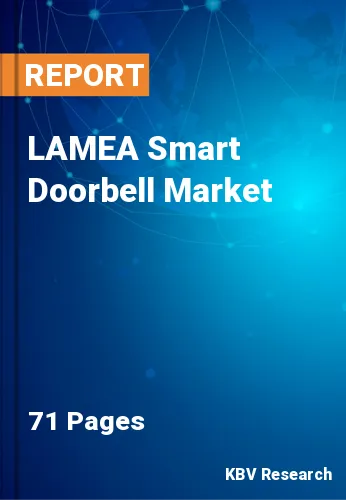The Latin America, Middle East and Africa Smart Doorbell Market would witness market growth of 20.0% CAGR during the forecast period (2022-2028).
Areas, where the camera cannot record, are known as privacy masks. In the camera's settings, users can create privacy masks. A blacked-out or blurry area on the camera's video recording would allow the camera to record. Users may intend to set up a privacy mask to prevent the camera from recording the neighbor's property or the sidewalk in order to safeguard other people's privacy. The video doorbell's activities are shared, so the user may email the footage to friends or family instantly. Users can even share the video on social media. If the homeowner is not at home, they can transmit the film to a neighbor and ask them to keep an eye on their house. Most video doorbells are fairly simple to install, and many of them come with all of the necessary tools and supplies.
With the constant adoption of new technologies and the rising disposable income of regional people, the regional countries are estimated to become urbanized in the coming years. Moreover, according to a recent report by the Organization for Economic Co-operation and Development (OECD), Africa's Urbanization Dynamics 2020, Africapolis, mapping new urban geography, the rate of urbanization as well as urban population growth in Africa has changed significantly across the continent and within its various regions.
Africa is one of the world's least urbanized regions, and its urbanization pace will continue to be among the quickest in the next years. In addition, Africa's urban population in 1950 was 27 million people, a tiny fraction of the 567 million people who live in cities today. Furthermore, the OECD report claims that Africa's fast urbanization after 1990 has been principally driven by a growing population and the reclassification of rural areas. As a result, due to the rapid urbanization and increasing number of digital technology-integrated homes, the growth of the regional smart doorbell market is surging and would also increase in the coming years.
The Brazil market dominated the LAMEA Smart Doorbell Market by Country in 2021, and would continue to be a dominant market till 2028; thereby, achieving a market value of $195.2 million by 2028. The Argentina market is estimated to grow at a CAGR of 20.7% during (2022 - 2028). Additionally, The UAE market would experiencing a CAGR of 19.7% during (2022 - 2028).
Based on Type, the market is segmented into Wireless and Wired. Based on Distribution Channel, the market is segmented into Offline and Online. Based on End User, the market is segmented into Residential and Commercial. Based on countries, the market is segmented into Brazil, Argentina, UAE, Saudi Arabia, South Africa, Nigeria, and Rest of LAMEA.
Free Valuable Insights: The Global Smart Doorbell Market is Predict to reach $7.7 Billion by 2028, at a CAGR of 17.8%
The market research report covers the analysis of key stake holders of the market. Key companies profiled in the report include Amazon.com, Inc., Panasonic Corporation, Google LLC, Arlo Technologies, Inc., Assa Abloy AB, Legrand S.A., Vivint Smart Home, Inc., LaView Eagle-Eye Technology, Inc., Night Owl Security Products LLC, and Skybell Technologies, Inc.
By Type
By Distribution Channel
By End User
By Country
Our team of dedicated experts can provide you with attractive expansion opportunities for your business.

